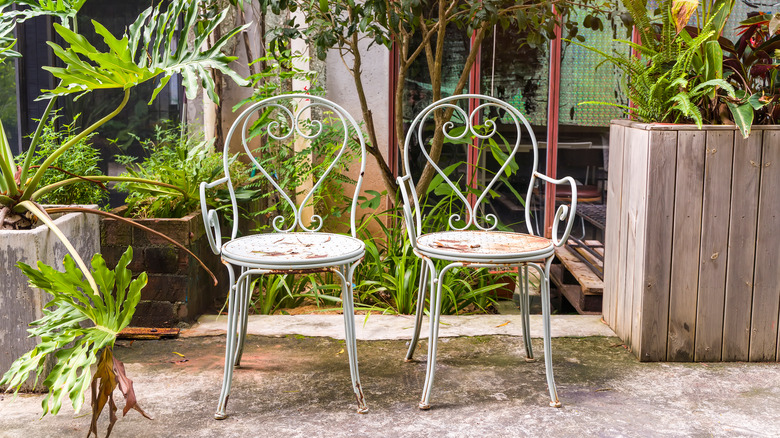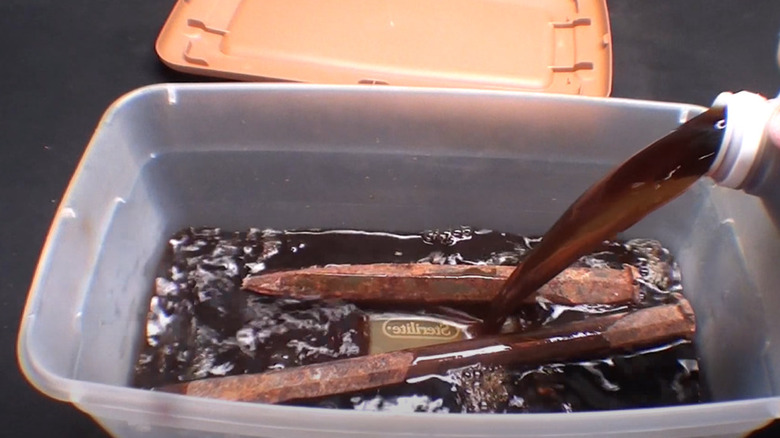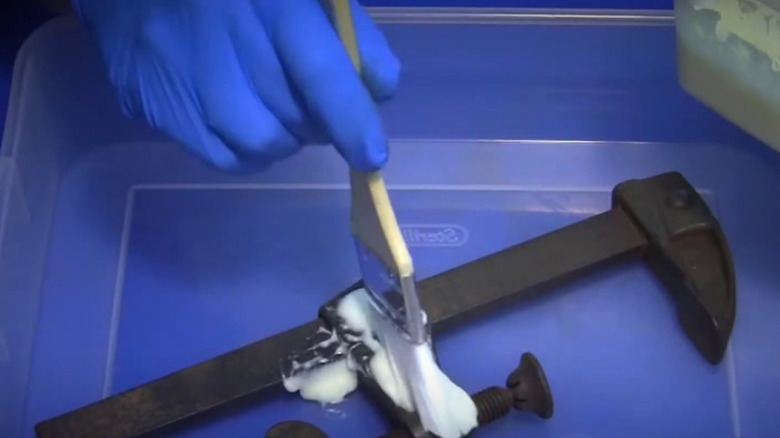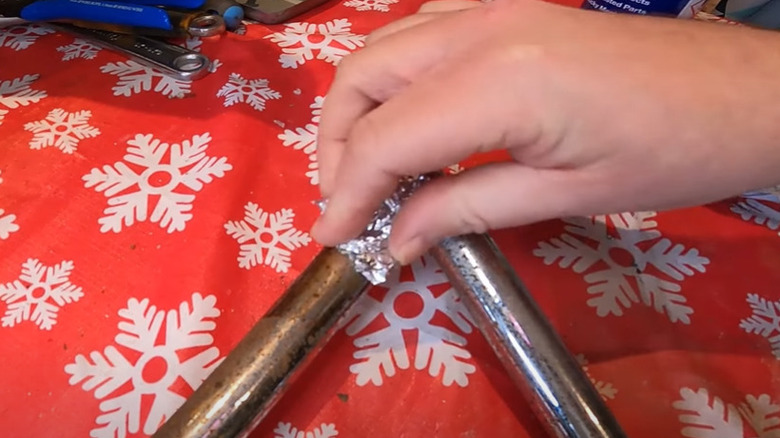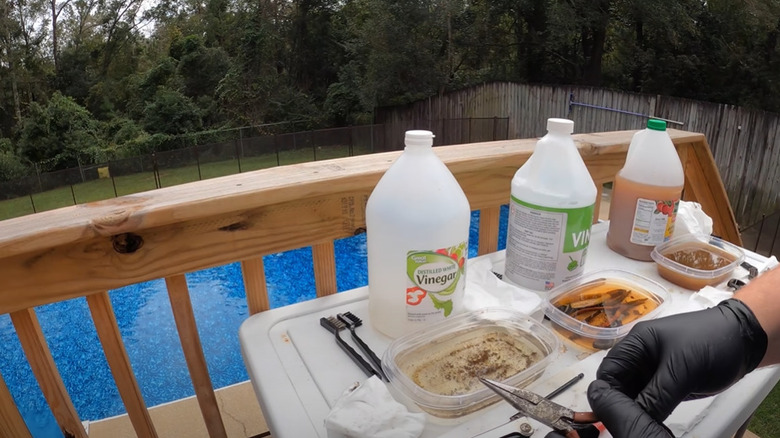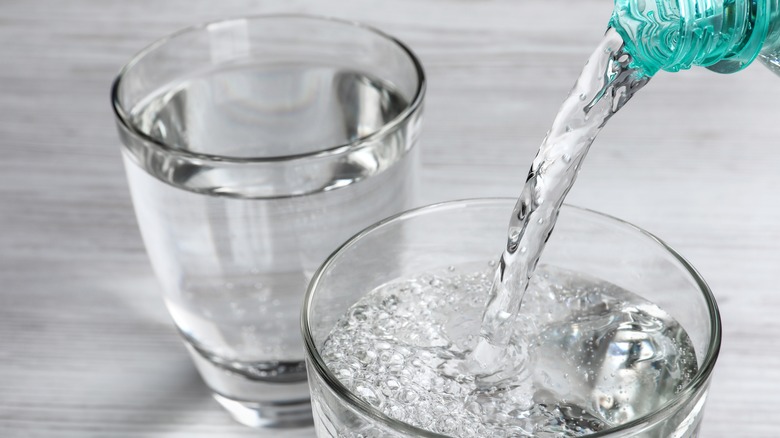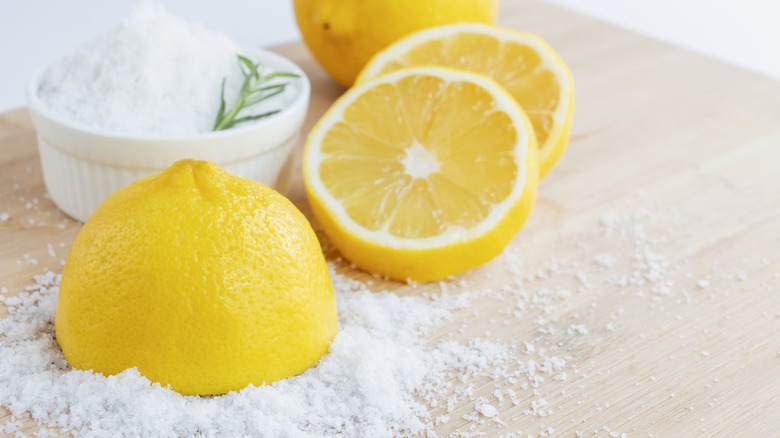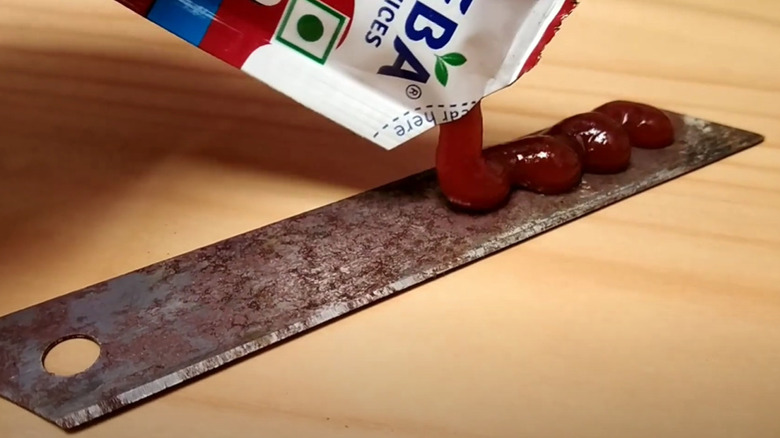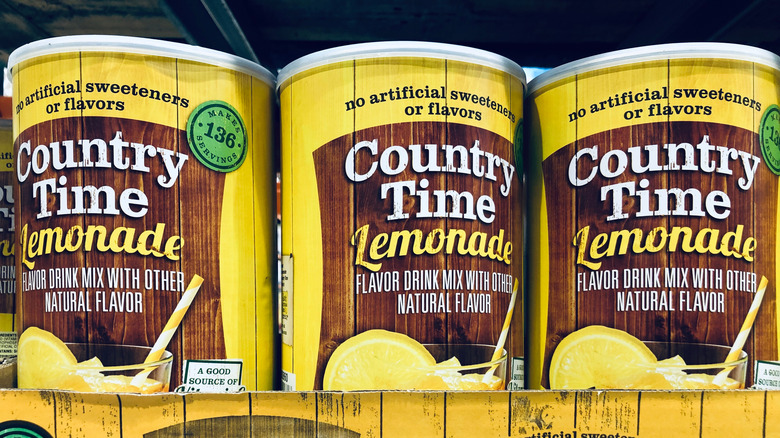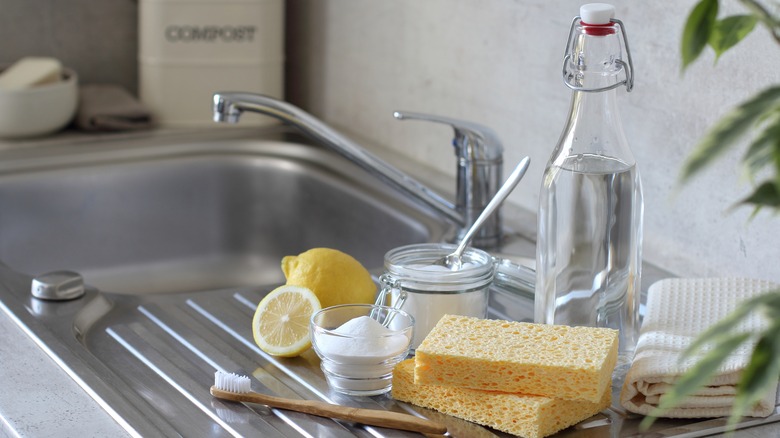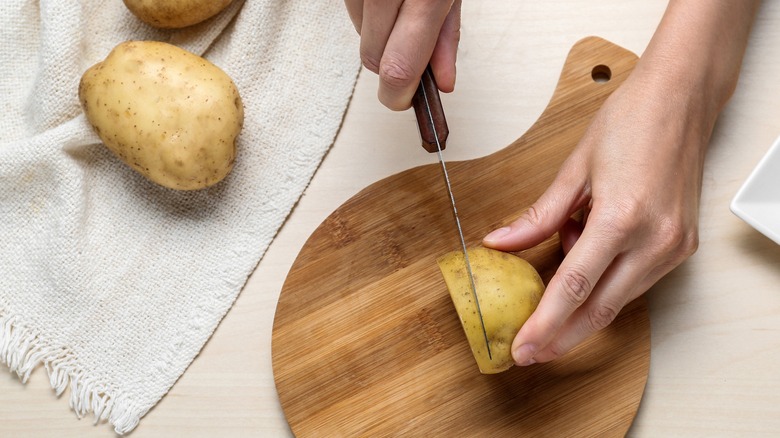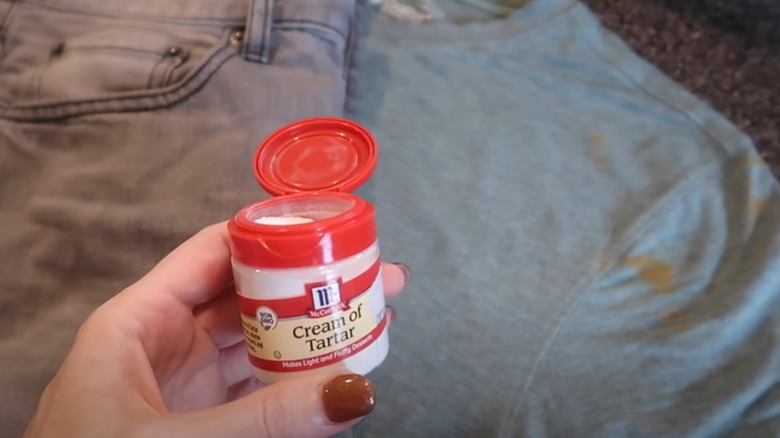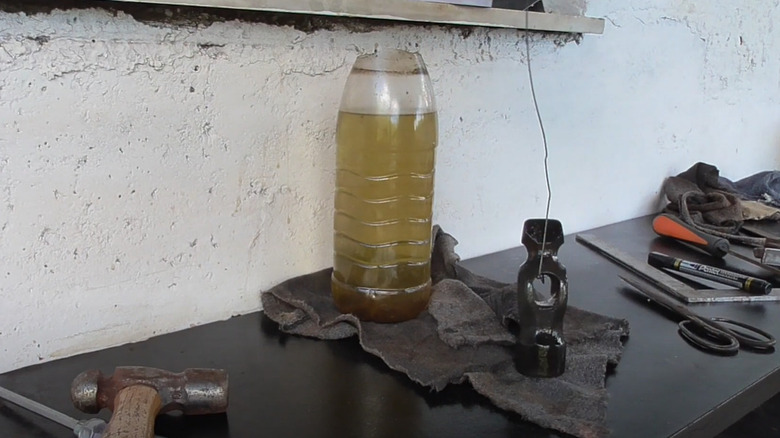12 Common Kitchen Ingredients To Tackle Rust Stains Naturally
We may receive a commission on purchases made from links.
Isn't it horrifying to find that an untouched dessert fork or charming patio furniture has become the latest victim of rust? Rust isn't just an eyesore. If left untamed, it embarks on a path of destruction, gradually eating away at metallic structures and hardware around your home. However, you don't need to yield to the sirens of commercial rust removers. Imagine a world where you could tackle rusty nuisances with nature's warriors stashed in your kitchen cupboards. From lemon to baking soda, vinegar, sweet molasses, and aluminum foil, you've got a whole battalion within your pantry for cleaning rust stains naturally.
Rust (or iron oxide, as chemistry aficionados would fancy) occurs when iron or an iron alloy locks horns with the blend of oxygen and moisture over an extended period. The kitchen rust-warriors discussed here challenge the rust in their unique ways. Some channel their acidic potency to dissolve stubborn rust stains, while others leverage their gritty nature to scrub them away. Speak of an effective, budget-friendly, and eco-conscious way of restoring the charm to your affected surfaces.
However, every battle has its share of precautions. In the case of rust fighting, arm yourself with gloves and eye protection when handling acidic contenders like vinegar and citric acid, as they aren't particularly kind to the skin. And because your goal is to rescue your rust-ridden items, not punish them, scrub gently. Lastly, consider shielding the rejuvenated item with a layer of oil to starve off rust resurgence.
Molasses
With its dark, viscous allure, molasses isn't just for sweetening baked goods; it takes on the unexpected and impressive role of busting rust. Behind this prowess is chelation, which essentially involves the formation of multiple bonds between a molecule (molasses) and a metal ion (rust), leaving the metal surface spotless. In a container, concoct molasses and water in a ratio of 1:10. Bathe rusty tools or objects in it, and be patient; the chelation might take two to four weeks, depending upon the stubbornness of the rust. Once the molasses concoction has done its job, scrub off the remaining loosened rust, rinse thoroughly, and revel in your rust-free items.
Lemon juice and baking soda
Bringing lemon juice and baking soda into the rust combat ring can be a game-changer, particularly for steel surfaces. The secret lies in the citric acid in the lemon juice that, with help from water, breaks down the rust, while baking soda's mildly abrasive texture helps scrub it off. Kick-off this rust removal hack by mixing lemon juice and baking soda to form a dense paste. Smear this onto rust stains, and give them 30 minutes to sit. When time's up, mist the paste with water, scrub the rusty surface with an old toothbrush or abrasive sponge, and then wash it all with water.
Aluminum foil and salt
Aluminum foil and salt removing stubborn rust on outdoor furniture seems like an old wive's tale, but it's rooted in pure science. We're talking about galvanic corrosion, a kind of electrochemical process where one metal corrodes when it comes into contact with another in the presence of electrolyte. In our case, when salted aluminum interacts with rust, a subtle exchange of electrons happens, thereby removing the rust. Lead this warrior-like cleanup by making a concentrated salt solution. Then, wet a bunched-up aluminum foil with the solution before scrubbing the rusty spots. Should the aluminum dry up before finishing its job, re-wet and continue scrubbing. Finally, wipe down the surface with a clean, moist cloth.
Vinegar
Prized as a versatile kitchen staple that elegantly transitions into cleaning tasks, vinegar is armed to fight rust via its acetic acid content, with higher concentrations delivering the best results. Unleash vinegar's magic – soak the rusty tools in undiluted white vinegar. Allow it to soak for a few hours — ensuring the acetic acid has ample time to work its magic. Post-soak, face off against the loosened rust with a sturdy scrubbing brush, clean with soapy water, rinse well, and pat dry to reveal gleaming, rust-free surfaces. Directly apply vinegar to the rusty surface of larger items rather than soaking.
Club soda
Unassuming yet effective, club soda can come to your rescue when facing light to moderate rust on items like hinges, bolts, and pliers. The carbonated water and sodium carbonate in club soda do the trick here, acting as a molecular and physical sandblasting machine that disrupts the rust's structure and lifts it off the surface. Unveil this bubbly troubleshooter by spraying it directly onto the rusted areas, then let it sit for a few minutes, allowing the fizzy carbonation to undermine the rust. Alternatively, soak the rusty item in a container filled with club soda. After enough fizzing, scrub off with a sturdy brush or cloth. It could take a few rounds, depending on the rust's tenacity.
Lemon
When life gives you lemons, take out rust (literally). It's simple chemistry where the citric acid in lemons breaks down light to moderate iron oxide for easy removal. Sprinkle some salt on the rusty tool or hardware, squeeze fresh lemon on the salt layer, and let the lemon-salt mixture sit on the metal surface for about two hours before scrubbing with the lemon rind. More stubborn stains demand bringing in the big guns: scouring pad, wire brush, or steel wool. Finally, wash off the residue with water.
Ketchup
Ketchup, a commonplace kitchen ingredient, conceals an astonishing capacity for natural rust removal. Nestled within the tart sweetness is vinegar, that acetic acid powerhouse capable of disintegrating stubborn grime and rust stains. Liberally dispense ketchup over the affected area, then let it work undisturbed for 30 minutes (or several hours if the stains prove hardier). Once the wait is over, rinse well or wipe with a soft cloth. Caution: Dry the item thoroughly after rinsing it with water, considering water is one of the primary conditions for rust formation. Treat any residual stains with another application of ketchup.
Lemonade
In its powdered form, lemonade serves more than merely quenching your thirst — it can also handle challenging rust stains. Remarkably, the citric acid in lemonade powders introduces a potent chelating ability. It means that it links up with rust, disassembling it and thereby facilitating easy removal. This rust removal hack involves using a piece of cloth to apply the lemonade powder directly to the rust-stained surface, allowing it to remain for a few hours or longer to wear down the stains. Subsequently, wipe off the rust and lemonade residue with a clean, damp cloth.
Salt
Salt's double-duty as a rust buster stems from its abrasiveness, which you can fortify with an acidic liquid to form an abrasive mixture that breaks down and lifts off rust stains on contact. To deploy salt in your fight against rust, create a dense paste of salt and an acidic liquid, such as vinegar or lemon juice, then apply this concoction to the rusted areas. Give the paste sufficient time to wage its rust-eradication campaign. Once victory is imminent, deploy a soft brush to scrub away the remnants of the defeated enemy. Finally, rinse the freshly liberated surface with soapy water before drying with a paper towel or clean cloth.
Potato
Raw white potatoes take an unlikely center stage in combating rust on outdoor metallic furniture or cast iron pans, all thanks to their rich oxalic acid content. The natural acid works by breaking down the stains and easing their removal. Cut a potato, dab it in baking soda or dish soap for some grit, and rub it over the rusted area. Rinse and repeat as necessary, ensuring to use the potato while it's still fresh and juicy to achieve even more impressive results. Once the stains fade or disappear to your satisfaction, rinse the item under a faucet before dabbing it with a dry microfiber cloth.
Cream of tartar
Cream of tartar, like the McCormick Cream of Tartar for $8 on Amazon, might be a quiet resident in your kitchen cupboard, usually brought out for baking purposes. Yet, it wields a secret weapon against iron oxide. This acidic salt works against rust like the acids in ingredients like lemon and vinegar. Combine cream of tartar with hydrogen peroxide, slather the paste on rust stains, and allow it enough dwell time (at least an hour) to interact with the rusty patches and disengage the surface. Afterward, clean off the leftover paste and dislodged rust particles with a cloth, rinse the metal under a faucet, and dab with a dry cloth.
Citric acid
A must-have ingredient in many kitchens for food flavoring and preservation, citric acid gains a new function in our rust-busting line-up. Dissolve ½ ounce of citric acid with 15 fluid ounces of warm water in a container large enough to bathe your rust-afflicted metal objects. Then, submerge the rusty items, making sure they are entirely cloaked. When dawn breaks, scrub the objects with a brush, and once satisfied with the results, remember the need for a thorough rinse to remove traces of citric acid and rust particles. Finally, thoroughly dry the items — you won't want to invite that pesky rust back again.
